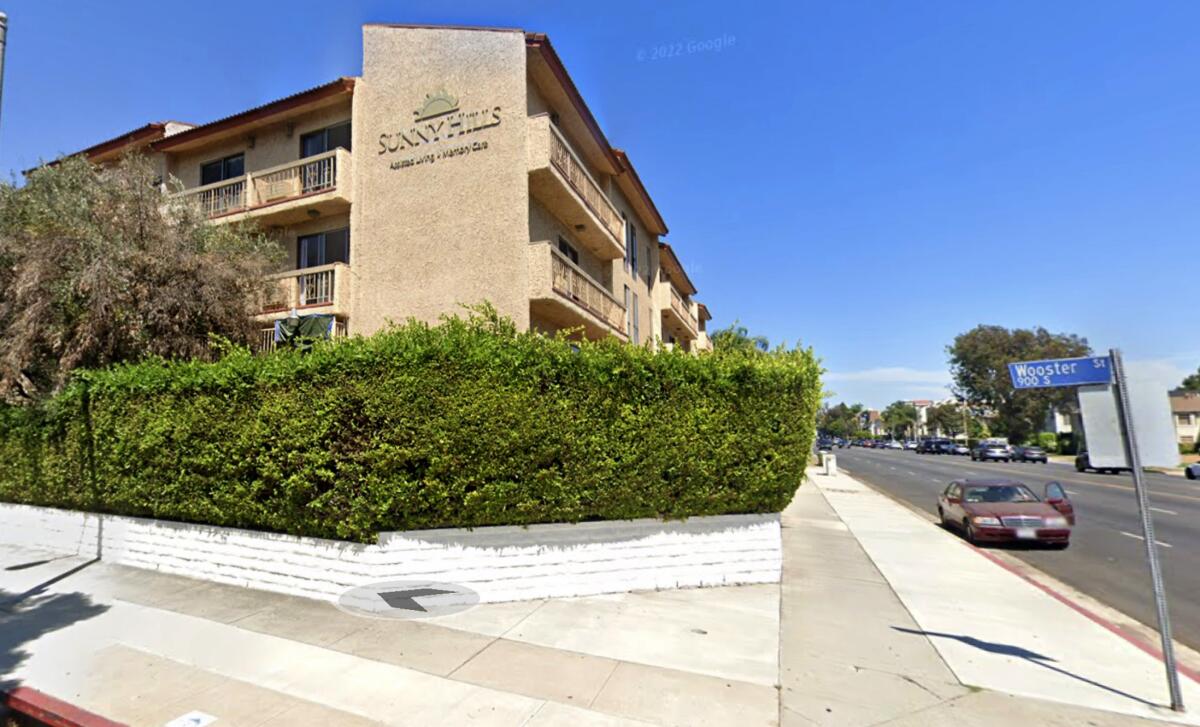L.A. assisted living facilities discriminated against non-Koreans, federal lawsuit alleges

- Share via
Three Los Angeles assisted living facilities with a mostly Korean clientele turned away non-Koreans who inquired about moving in , with workers stating that only Koreans would be accepted, according to a federal lawsuit filed by the Fair Housing Federation of Southern California and two Black plaintiffs.
The federation, a nonprofit that seeks to eliminate housing discrimination, employed 10 “testers” who posed as family members of senior citizens interested in living in one of the facilities — Sunny Hills Assisted Living in Pico-Robertson, Garden Silver Town in Koreatown and Mugunghwa Silvertown just south of Koreatown.
The assisted living facilities told the seven non-Korean testers that they only accepted Koreans, according to the lawsuit. The three Korean testers sent to the facilities moved further along in the admissions process, were given a tour and allowed to submit the prospective resident’s medical records, the lawsuit said.
Sunny Hills administrator Steve Cho told The Times on Wednesday that he and other staffers evaluate whether an applicant is healthy enough to live at the facility, which can’t care for people with severe mental or physical illnesses.
“Whether they are foreigners, Koreans, white, Black, it doesn’t matter to us,” Cho said in Korean. “The most important factor is their condition.”
But the lawsuit, filed last Friday, told a different story.
Plaintiff Lydia Mojica Behrens called Sunny Hills in February 2022 hoping to find a place for her 89-year-old mother, who suffers from debilitating arthritis and other conditions, according to the lawsuit. When Behrens said her mother’s name, Zenaida Mojica, a worker replied, “Mojica? Is that Spanish?”
Behrens and her mother, who is also a plaintiff, are Black of Cuban ancestry.
According to the lawsuit, the worker conferred with a colleague, then told Behrens, “Well we only take Korean people. We are Koreans and everyone here is Korean.”
When Behrens asked for clarification, the worker added that every resident and employee was Korean, according to the lawsuit. There was no need for Behrens to take a tour, since her mother was not Korean and wouldn’t be able to live there, the lawsuit said.
According to the lawsuit, when two Black testers inquired about a spot for an elderly parent at Sunny Hills the next month, they got similar responses, with one employee stating, “Only Koreans are cared for here.”
A tester of Korean ancestry was treated differently, the lawsuit said, receiving a tour of the facility and a price list.
In addition to compensatory and punitive damages and attorneys’ fees, the plaintiffs are asking that the defendants no longer discriminate against applicants and that the plaintiffs be given a place at the facilities.
Odion Okojie and David Iyalomhe, attorneys representing the plaintiffs, did not respond to requests for comment.
Testers from the housing federation were treated similarly at the two other assisted living facilities in March 2022, according to the lawsuit, with non-Korean testers turned away and Korean testers welcomed.
According to the lawsuit, a Black tester at Garden Silver Town was told to inquire at facilities that accept Black people, since it was only for Koreans.
A white tester who called Mugunghwa Silvertown was told that the facility was a “100%” Korean facility and that the prospective resident could not apply as a non-Korean, the lawsuit said.
“Not only did this never happen, there’s no way it could have happened,” Mugunghwa Silvertown administrator Jessica Shin said in Korean. “Our employees go through anti-discrimination training.”
Garden Silver Town administrator Steve Kim called the discrimination allegations “some sort of misunderstanding.”
“I’m in complete shock,” said Kim, who said he found out about the lawsuit in the Korean-language media. “We’ve never discriminated against anyone coming into the facility.”
Garden Silver Town is in the heart of Koreatown, so all of its 60 residents are usually Korean, Kim said.
“In the past, we’ve had African American residents, Caucasian residents,” Kim said. “It’s just in the last few years, it’s been a lot of Koreans that have been coming in, and that’s just how it’s been.”
Cho of Sunny Hills said that prospective residents are always invited to come in and have a meal of Korean food such as rice, soup and kimchi that non-Koreans may not be familiar with.
Two of Sunny Hills’ roughly 90 residents are non-Korean, Cho said. He added that he doesn’t see a problem with a facility in a predominantly Korean neighborhood having a Korean staff and serving an overwhelmingly Korean client base.
“I think there is an underlying jealousy behind these allegations against these successful Korean-run facilities,” he said. “There are a lot of facilities that just have predominantly white people and predominantly Black people. Is that discrimination?”
More to Read
Updates
12:00 p.m. Feb. 15, 2024: This article was updated to use the term “assisted living facility” rather than “nursing home.”
Sign up for Essential California
The most important California stories and recommendations in your inbox every morning.
You may occasionally receive promotional content from the Los Angeles Times.











